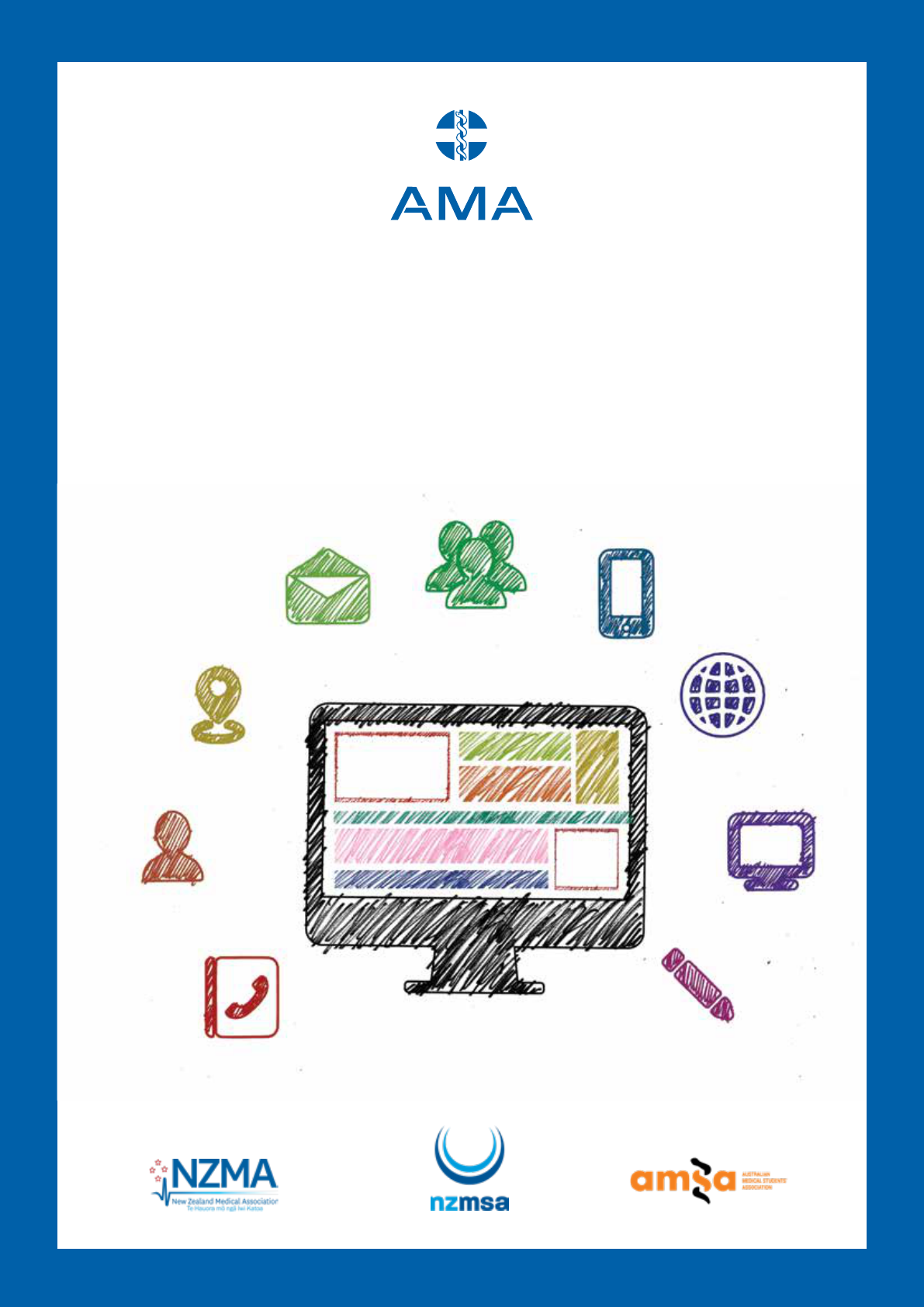
1
A GUIDE TO SOCIAL MEDIA &
MEDICAL PROFESSIONALISM:
The tips and traps every doctor and
medical student should know
Introduction Version as of 13/12/2019

2 2
The use of social media by the medical profession is common and growing.
It has changed the way we can communicate with each other and the wider
community.
We can now share information, create content, have meaningful social interactions, and
collaborate in real-time for professional and personal benets.
However, social media has the potential to blur the boundaries between private and
professional.
There can be immense professional benets by having an active presence through
the proper use of social media, but inappropriate online behaviour has the potential to
undermine professional integrity, doctor-patient and doctor-colleague relationships,
future employment opportunities, and public trust and condence in the medical
profession.
As doctors and medical students, our professional standards remain the same whether
communicating through social or traditional media, and social media can raise some
ethical dilemmas that you might not have thought about as part of your everyday use.
The revised guide to social media and medical professionalism will help ensure you can
enjoy using social media while maintaining the standards of ethical and professional
conduct expected of doctors by the profession and wider community.
This guide has been reviewed and endorsed by the Australian Medical Association (AMA) and its Council
of Doctors in Training (AMACDT), the New Zealand Medical Association (NZMA), the New Zealand Medical
Students’ Association (NZMSA), and the Australian Medical Students’ Association (AMSA) with input from the
Avant and MDA National.
INTRODUCTION

3 3
Have you ever...
Googled yourself? Are you
comfortable with the results
that are shown?
Posted information about a
patient or person from your
workplace on Facebook or
Twitter?
Become a member of any group
or ‘liked’ a page that might be
considered racist, sexist, or
otherwise derogatory?
Put up photos or videos of
yourself online that you would
not want your patients,
employers or people from your
workplace to see?
Checked your privacy settings
on Facebook?
Felt that a friend has
posted information online
that may result in negative
consequences for them? Did
you let them know?
Checked whether there is a
social media policy where you
work or are on placement?
Added patients as contacts on
social media?
Made a public comment online
that could be considered
offensive?

4 4
1. You’re always a doctor ......................................................................... 5
2. Condentiality matters, and identiers are everywhere. ......................8
3. Consider who you friend or share information with on social media. ....11
4. Maintaining your professional reputation online. ................................ 13
5. You are responsible for your advertising. ............................................ 16
6. Managing negative patient comments online. .....................................18
7. Using social media for advocacy. ........................................................20
8. Further reading. ................................................................................... 22
contents

5 5
01
YOU’RE ALWAYS A DOCTOR
+ Think carefully about
publishing something on
social media if you would
not be comfortable having
your patients/colleagues/
employers see it.
+ Take care not to post images
or comments that might
be endorsing activities
or behaviour that could
damage your professional
reputation or be in breach
of your professional
obligations.
+ Remember the content you
post may be discoverable.
+ Never assume that you will
be able to delete something
that you have posted online.
+ Think about not using your
full name and ensuring
photos that can easily
identify you are not visible to
the public.
+ Where possible, try to control
what and when photos of
you are posted online.
+ Be aware of your
professional and employer’s
social media policies.
KEY TIPS
Social media is designed to connect people. Different
people use social media in different ways and we’re
constantly fed mixed messages abo
ut using social media.
Professional capacity? Personal capacity? Not at all?
Some use it solely in a professional capacity while others
use it personally, and many use a mix of the two. While you
may think your personal and professional profiles are
different and separate, often they’re connected.
The reality is that no matter what happens privately, you are
always a doctor and need to consider how you present
yourself. Your professional character may be judged by the
way you conduct yourself online.
1
If you post significant amounts of personal information on
social media, you need to consider who has access, and
what impact this might have on your professional
reputation and relationships.
Unlike other media, social media can quickly spread
information to a vast number of people globally.
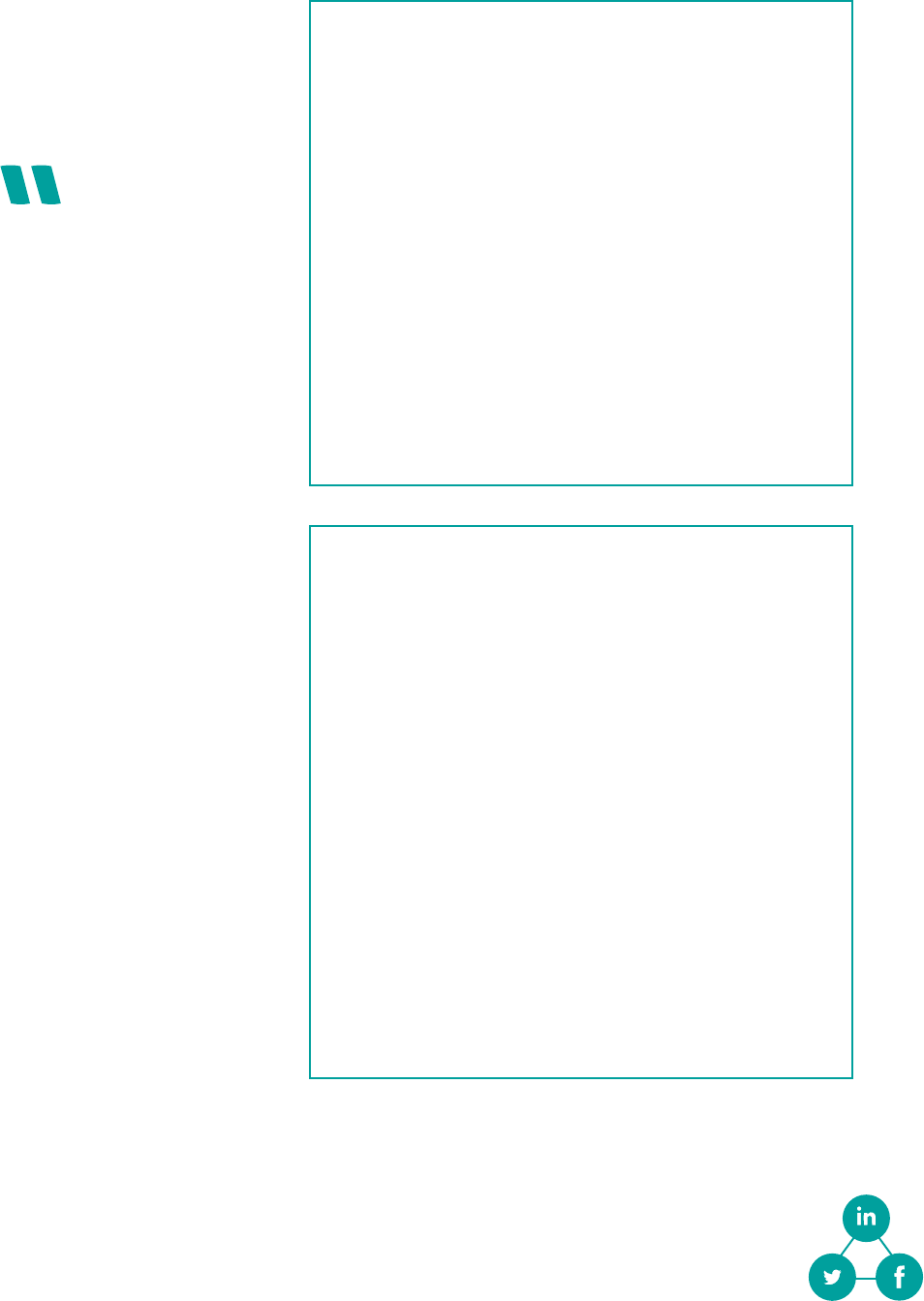
6 6
While not illegal, situations like the ones described in these
case studies may be damaging professionally for you and/
or your employer. You may also nd yourself the subject of
a complaint to your registration authority.
Case study 1: Unprofessional comments
A doctor in training posted some impulsive comments on an
online forum about a TV program on transgender adults.
The person who was the subject of the derogatory
comments clicked on the doctor’s prole which identied
the hospital they worked at and they were able to make a
complaint to the hospital.
The hospital considered it a serious lapse in professionalism
and took disciplinary action against the doctor.
Example provided by MDA National.
Case study 2: Professionalism and
hospital policies
A surgical registrar was talking to a scrub nurse at the gym
and they decided it would be funny to pose for some cross
t activities in the operating theatre at the hospital using the
theatre equipment.
Photos were taken of the poses and the registrar posted
them on the gym’s Facebook page with a comment that
identied both the hospital and the registrar.
The hospital administration became aware of the photos
(after they had received more than 120,000 Likes on the
gym’s Facebook page).
The registrar was asked to attend a meeting and was
reprimanded for using the hospital and its equipment in a
manner that was not appropriate and warned not to do it
again.
Example provided by MDA National.
The hospital
considered it a
serious lapse in
professionalism
and took
disciplinary
action against
the doctor.
01 – YOU’RE ALWAYS A DOCTOR: A GUIDE TO SOCIAL MEDIA & MEDICAL PROFESSIONALISM
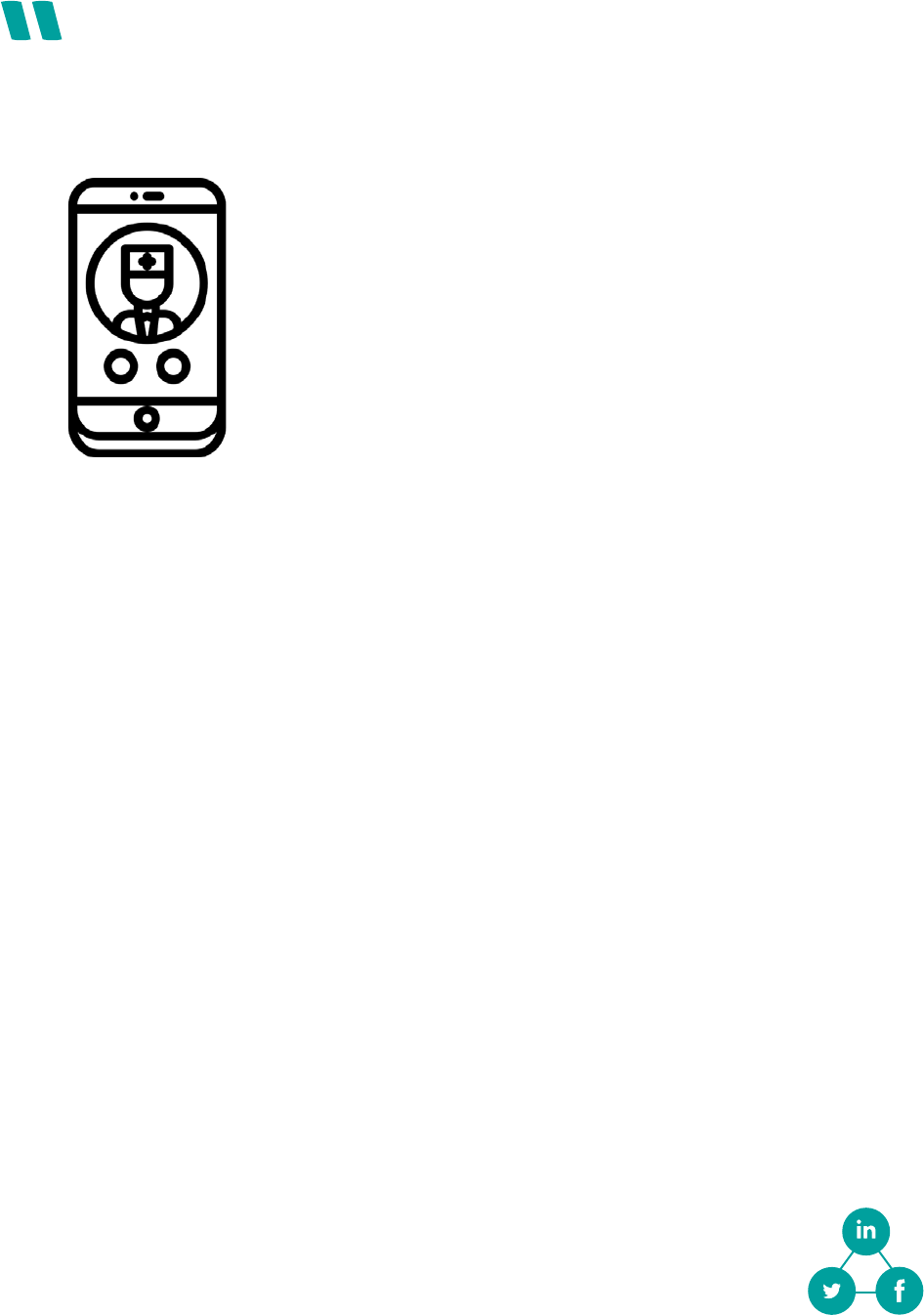
7 7
Your personal social media activities could impact negatively on how
patients, colleagues and/or others perceive you.
Consider how you portray yourself on your personal social media proles
and how easy it is for patients to nd you. Not using your full name and
ensuring photos that can easily identify you are not visible to the public
are two ways to prevent patients from nding you on social media.
Check what your prole looks like to someone who isn’t your friend and
remove any photos or posts that you do not want the general public to
see.
Before posting, always ask yourself “What would my patients/
colleagues/employers think if they saw this?” and “Would this be in
breach of my employer’s policies, my employment conditions and/or my
obligations under the regulatory authority?” If in doubt, re-evaluate your
post!
... ask yourself “What would my patients/
colleagues/employers think if they saw this?”
01 – YOU’RE ALWAYS A DOCTOR: A GUIDE TO SOCIAL MEDIA & MEDICAL PROFESSIONALISM

8 8
02
CONFIDENTIALITY
MATTERS, AND IDENTIFIERS
ARE EVER
YWHERE
+ Obtain written and specific patient
consent before you post patient
information or images online.
+ Protect patient information by de-
identifying the information and/or image
you post.
+ Remember it may still be possible to
identify a patient, staff member, or your
employer from the information you post;
for example from the timing of the post,
from information that remains in the
background of an image or in the
metadata of an image.
2
+ Check your employer’s policies about
posting on social media. Even with
patient consent, you may be prohibited
from posting content by hospital
policies.
3
+ Be wary about the secondary use of
data. For example, granting permission
for an online social platform to access
your profile or other information on your
device e.g. address book, may allow
access to confidential patient details.
Check the terms and conditions before
signing up.
+ As a precaution, turn off auto-upload of
pictures to social media or back up sites.
KEY TIPS
Doctors have a responsibility to ensure that
their use of social media is consistent with their
ethical and legal obligations to protect patient
condentiality. It is important to remember
that breaches of patient condentiality online
can ha
ve far wider implications because of the
reach of social media and permanency of digital
information.
1
Maintaining patient condentiality upholds the
public’s trust in the medical profession and
maintains our ability to treat patients effectively.
Breaching condentiality can result in complaints
to your employer or medical registration authority
(with potential disciplinary action, including loss
of employment/registration), the involvement of
the Privacy Commissioner, or even legal action
(including civil claims for damages or criminal
prosecution depending on the content).
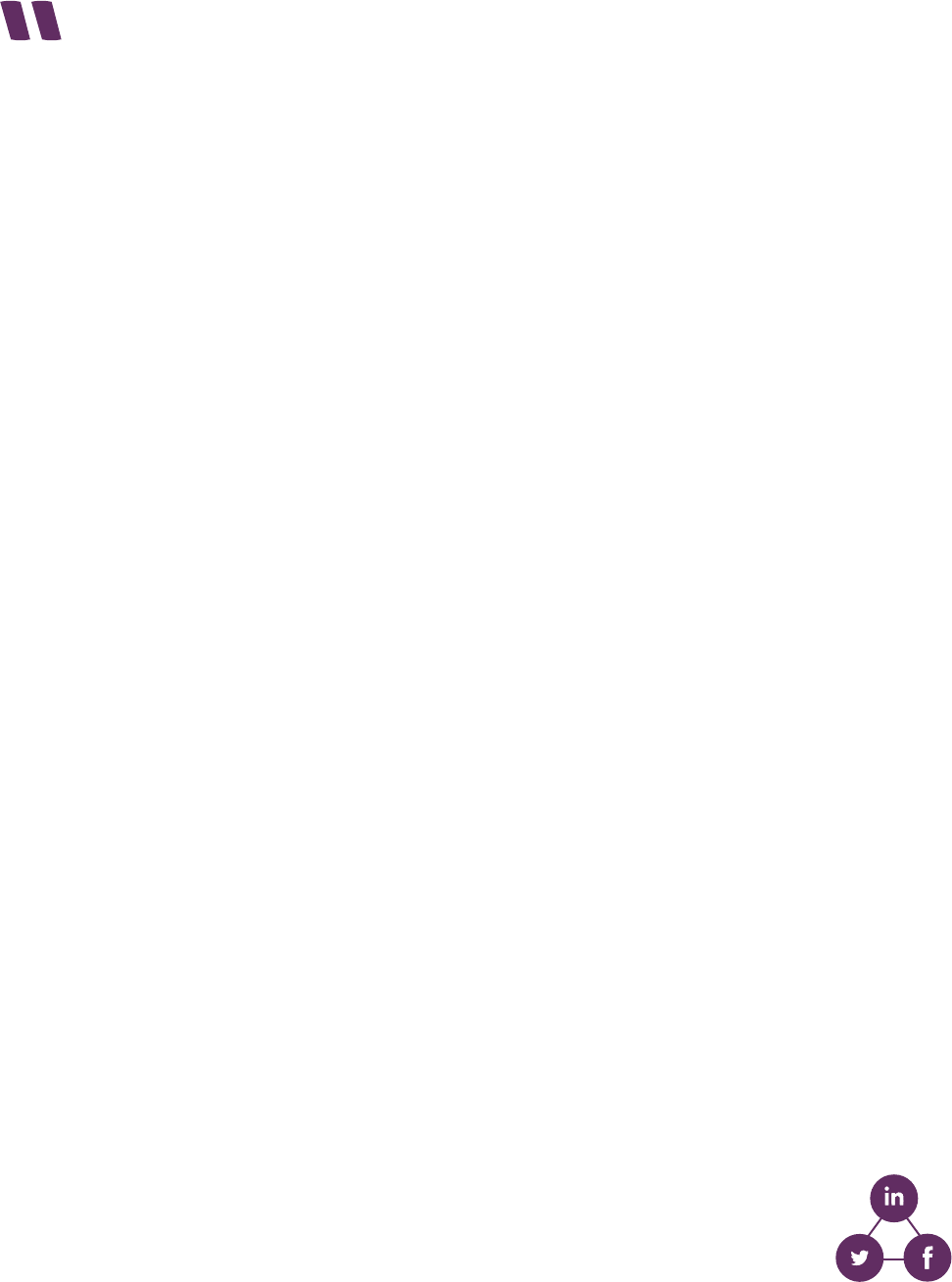
9 9
What about sharing clinical images online?
Maybe you’ve shared a clinical image taken on your phone
in a professional and/or closed online forum for clinical
and/or educational purposes.
Remember that clinical images are “health information” and
must be treated with the same privacy and condentiality
as any other health record or information.
Never use a clinical image in an online forum unless you
have the patient’s consent to do so, or if the patient would
reasonably expect you to use the image in this way, or if
you are otherwise permitted by law to do so.
If you send a clinical image to the wrong person or post
an image online that you later believe breaches patient
condentiality or your professional or employment
obligations, seek advice from hospital management, your
employer or your medical defence organisation as soon as
possible.
On some forums, you may be able to delete the image or
the post immediately. However, you should be aware that
even when the image is deleted from a forum, it may live
on as a cached le or archived content on a search engine.
This means that the content is still searchable, but when
the link is clicked, nothing will appear. You may submit a
request to remove cached content from services such as
Google after you have conrmed that the original content
has been deleted on the forum or another site.
... even when the
image is deleted
from a forum, it
may live on as
a cached le or
archived content
on a search
engine
02 – CONFIDENTIALITY MATTERS, AND IDENTIFIERS ARE EVERYWHERE:
A GUIDE TO SOCIAL MEDIA & MEDICAL PROFESSIONALISM

10 10
Should I use my own
phone to take a clinical image?
Before using your own phone to take a clinical image or sharing any
image online, familiarise yourself with your organisation’s policy on
clinical images and social media.
Security of communication about patients between
medical colleagues
When medical students (and junior doctors) join a medical team for
a new term, they are often added to the team’s ‘group message’ for
communicating such as WhatsApp.
While this is not public messaging, security of these mobile apps
has been raised recently
4
and some hospitals are creating their own
secure mobile messaging platforms to replace them.
If you do need to communicate with a colleague about a patient,
check if there is a platform endorsed by your hospital/employer rst
rather than using social media.
... If you do need to communicate with a
colleague about a patient, check if there is a
platform endorsed by your hospital ...
02 – CONFIDENTIALITY MATTERS, AND IDENTIFIERS ARE EVERYWHERE:
A GUIDE TO SOCIAL MEDIA & MEDICAL PROFESSIONALISM

11 11
03
CONSIDER WHO YOU
FRIEND OR SHARE
INFORMATION WITH ON
SOCIAL MEDIA
+ Consider separating your online
professional and personal prole
and content.
+ It is advisable not to extend friend
requests to patients.
+ Respond to friend requests from
a patient by directing them to a
professional social networking
page.
+ If you pay a company to manage
your social networking prole/s,
make sure the company
understands the professional
standards and guidelines you are
bound by. Remember you are still
responsible for any material they
post on your behalf.
KEY TIPS
Doctors and medical students have a duty to
patients and the community to maintain professional
boundaries.
A power imbalance exists between do
ctors and
patients, and the maintenance of clear professional
boundaries is important to the integrity of the doctor-
patient relationship and protects patients from
exploitation.
Friending or following a patient, former patients or
close relatives of a patient on social media can make it
difcult for doctors to maintain clear professional and
personal boundaries as patients can connect with you
on a personal, rather than professional, level and this
may be misinterpreted by patients.
While it is advisable not to establish online friendships
with patients e.g. not accepting friend requests from
patients nor sending friend requests to patients,
doctors working in small communities are likely to
have friends who are patients, former patients, or close
relatives of patients, and may need to think carefully
about the best possible way to maintain professional
boundaries online.
5
You could think about creating an online prole that
is maintained as a professional page only or join a
professional social networking site.
Patients can become friends or fans of your
professional page, which only provides information
relevant to the professional practice of that doctor.
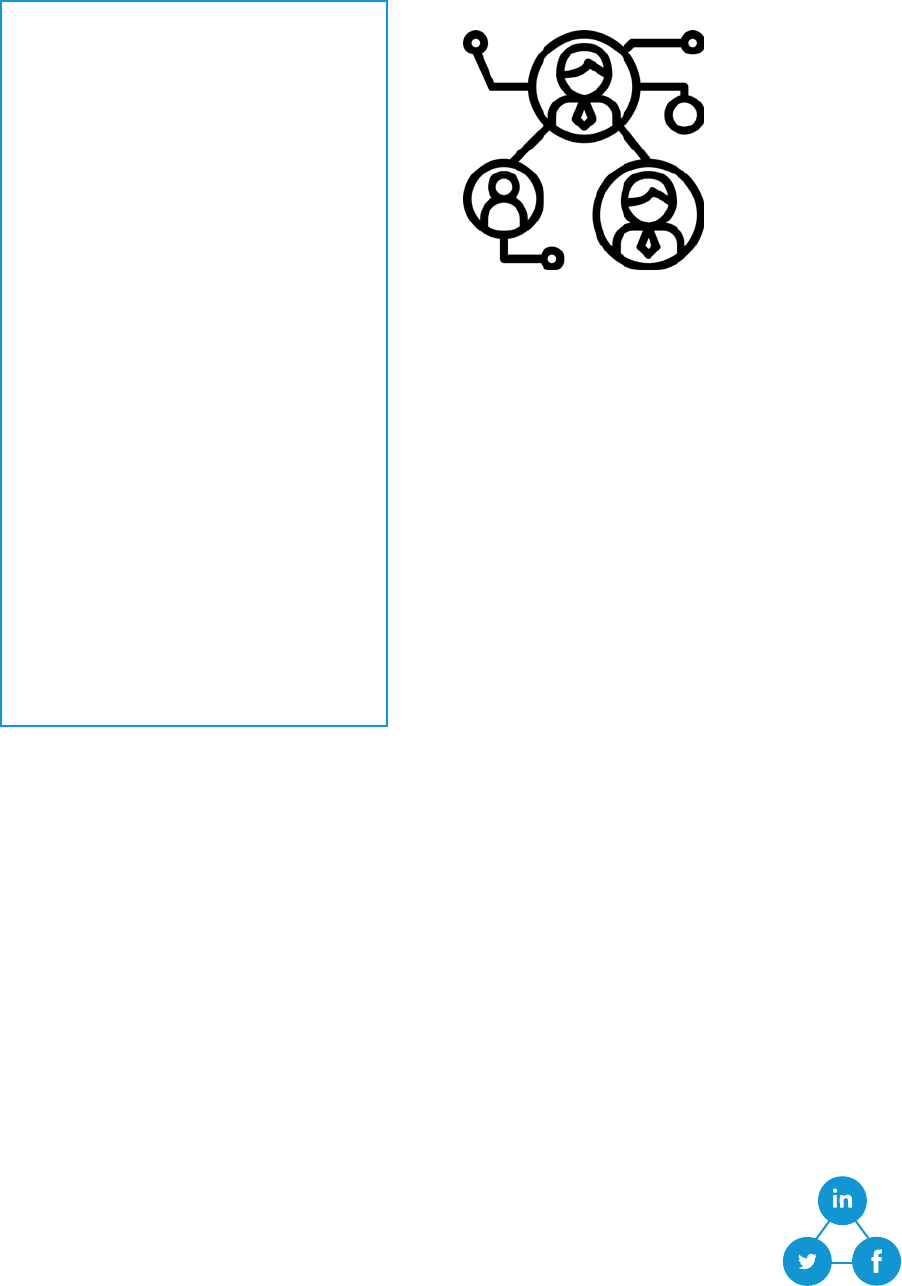
12 12
An uncomfortable hypothetical…
You get a friend request on your personal
social networking site from someone
whose name sounds very familiar, but
they have a photo of a dog as their
prole picture. You accept the request.
After looking through their prole page,
you realise that it is one of your patients.
The patient sends you a message to let
you know that they cannot make their
next clinic appointment but would like
to know their histology results from a
test ordered while the patient was in the
hospital. The patient also throws in a
cheeky comment about some photos
they saw of you wearing swimmers at
the beach.
If a patient does request you as a friend
on your personal social networking site,
a polite message informing them that
it is your policy not to establish online
friendships with patients would be an
appropriate response. You could also
consider directing them to a professional
social networking page.
03 – CONSIDER WHO YOU FRIEND OR SHARE INFORMATION WITH ON SOCIAL MEDIA:
A GUIDE TO SOCIAL MEDIA & MEDICAL PROFESSIONALISM

13 13
04
MAINTAINING YOUR
PROFESSIONAL
REPUTATION ONLINE
+ Did you know:
• the information you post on your
personal profile can be linked back to
you professionally.
• any information you post
anonymously can be linked back to
you.
• anything you post in a closed group
can be copied and shared.
+ Think carefully about whether beco
ming
a member or fan of a group might be
considered racist, sexist, or otherwise
defamatory.
+ Consider whether “liking” or “following”
groups that contain potentially
controversial topics or images could
reflect poorly on you as a doctor and the
profession.
+ Browse through all the groups that you
have joined and consider whether these
are an accurate reflection of the person
you are, and the values that you hold.
Report inappropriate content to site
administrators and request that it be
removed.
+ Safeguard your online reputation. If you
have not created an online profile,
search engines like Google may do it for
you and it may not be a profile you like!
Google your name on a regular basis to
see what comes up.
6
KEY TIPS
Be aware that any material posted online, even
anonymously can be traced to the original author.
Exercise sound judgement when posting online
and avoid making gratuitous or unsubstantiated
comments about individuals or organisations. This
could be viewed as a breach of your professional
obligations under the regulatory authority and be
subject to allegations of bullying.
Professional codes of conduct specify that doctors
should not engage in behaviours that can harm the
reputation of colleagues or the profession.
Defamation is the communication or publication
of false information about a person or certain
organisations that damages their reputation.
Material posted online by individuals or
organisations that are false, untrue, misleading or
deceptive can have signicant legal and nancial
consequences.
Be mindful about any comments you make about
colleagues (medical or otherwise) and employers
and consider whether it could breach your
professional obligations or policies held by your
employer, organisation or regulatory authority.

14 14
Online comments should always be respectful.
Think carefully about whether you should post
anything online if you are angry or upset.
If you see content that has been posted by
other doctors that may be harmful to patients
or the public and/or appears unprofessional,
you should bring it to the attention of the
individual and/or report it to your regulatory
authority. You may also flag harmful content
for removal on sites like Google and Facebook.
Should I post anonymously?
If you are posting as a doctor, our advice is to
avoid posting anonymously and to use your
own name.
If you are posting personally, it’s up to you but
as a rule, if it’s something that may impact on
your professional integrity, it might be better to
avoid posting it online in the rst place.
Clearly identifying yourself can lend credibility
and accountability to online communications.
When posting professionally, consider posting
your credentials. It’s also a good idea to state
whether you are or are not representing your
employer or institution.
Case study 3: Posting
anonymously
In August 2018 the NHS England Director
of Primary Care and Deputy Medical
Director resigned following revelations
he had posted anonymously on an online
forum used by GPs under the pseudonym
‘Devil’s Advocate’.
While his intention had been to provoke a
balanced discussion about contentious
issues by acting as the ‘devil’s advocate’,
his comments were found to be in breach
of NHS policy and offensive to colleagues.
The NHS determined the postings had
severely compromised his integrity and
that his position at NHS England was no
longer tenable.
Is it ok to tag colleagues?
Always be courteous when communicating
with colleagues over social media, particularly
when in public view. When sharing social
media posts with colleagues or ‘tagging’ them
to draw their attention to it, be mindful that
they may not wish to be associated with it in a
public forum.
Clearly identifying yourself can lend credibility and
accountability to online communications
04 – MAINTAINING YOUR PROFESSIONAL REPUTATION ONLINE: A GUIDE TO SOCIAL MEDIA & MEDICAL PROFESSIONALISM
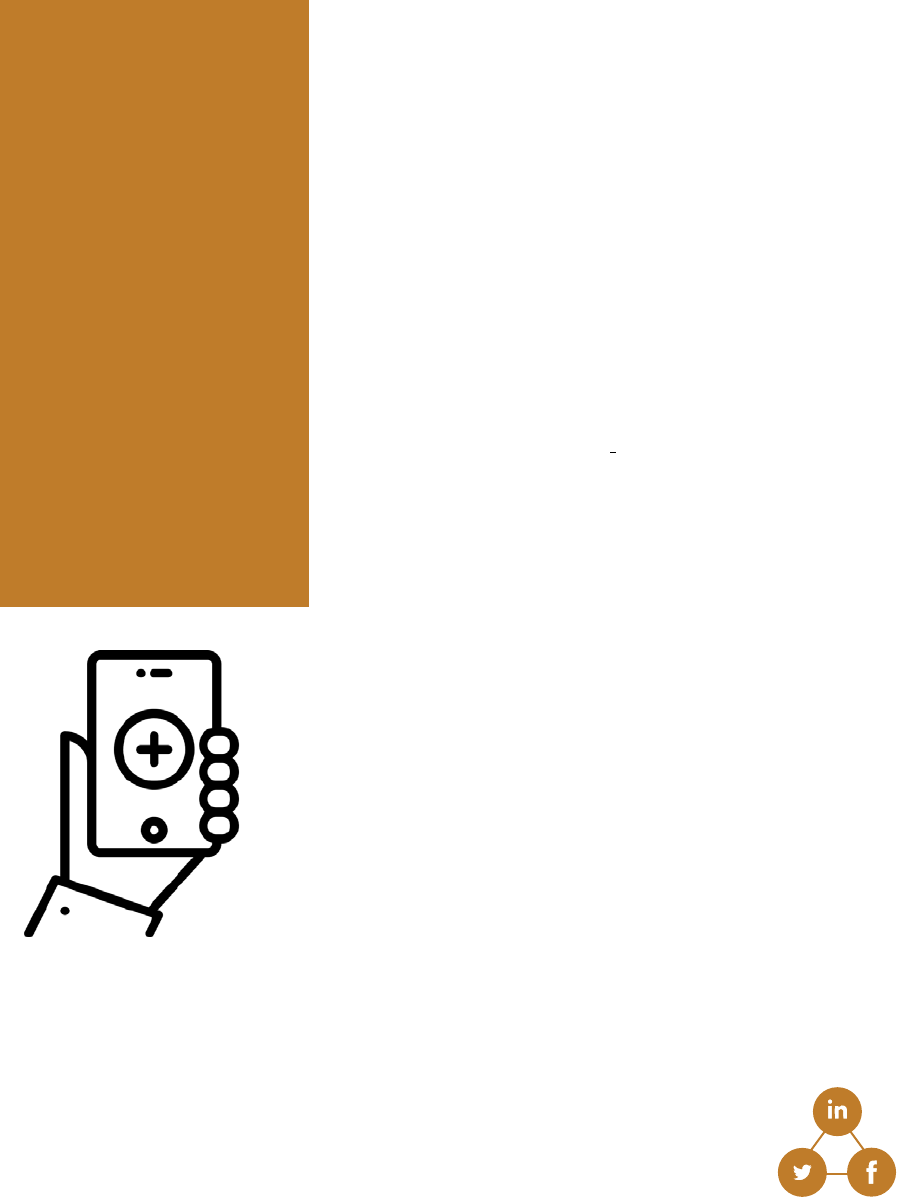
15 15
Understand and review your
privacy settings
What about closed groups?
Closed professional groups allow peers to engage
and discuss issues in a private environment.
Administrators must approve members and only
group members can see posted content.
Closed groups can be useful in bringing together
people with a common interest and can create a
sense of community. They can be a great way to
engage with your peers or enact change – either
socially or in the workplace.
They can also be used as a platform for advocacy o
n
important issues.
But, it is still important to be mindful of your
behaviour as many closed groups may not be as
private as they appear, and non-medical people may
also be members. Consider how the public would
perceive your interactions in these groups, even if it
is intended for medical professionals only.
Remember that anything you post in a closed group
might be copied and shared,
7
and that the same
professional standards apply to your behaviour as
part of a closed group.
It’s your decision on how secure you want to make
your social media accounts, but privacy can never
be guaranteed and there is always the risk that what
you post could be shared.
It’s worthwhile reviewing your social media content
regularly to ensure you’re happy with what’s
displayed.
+ Understand the privacy and
security settings of your
social media platforms and
review these regularly.
+ Don’t post information which
could be used for identity
theft or used inappropriately
by a third party.
+ Keep your passwords
secure.
+ Consider encryption.
+ Deleting information does
not provide absolute
protection – it is almost
certainly still stored
somewhere in cyberspace,
and theoretically
permanently accessible.
KEY TIPS
04 – MAINTAINING YOUR PROFESSIONAL REPUTATION ONLINE: A GUIDE TO SOCIAL MEDIA & MEDICAL PROFESSIONALISM
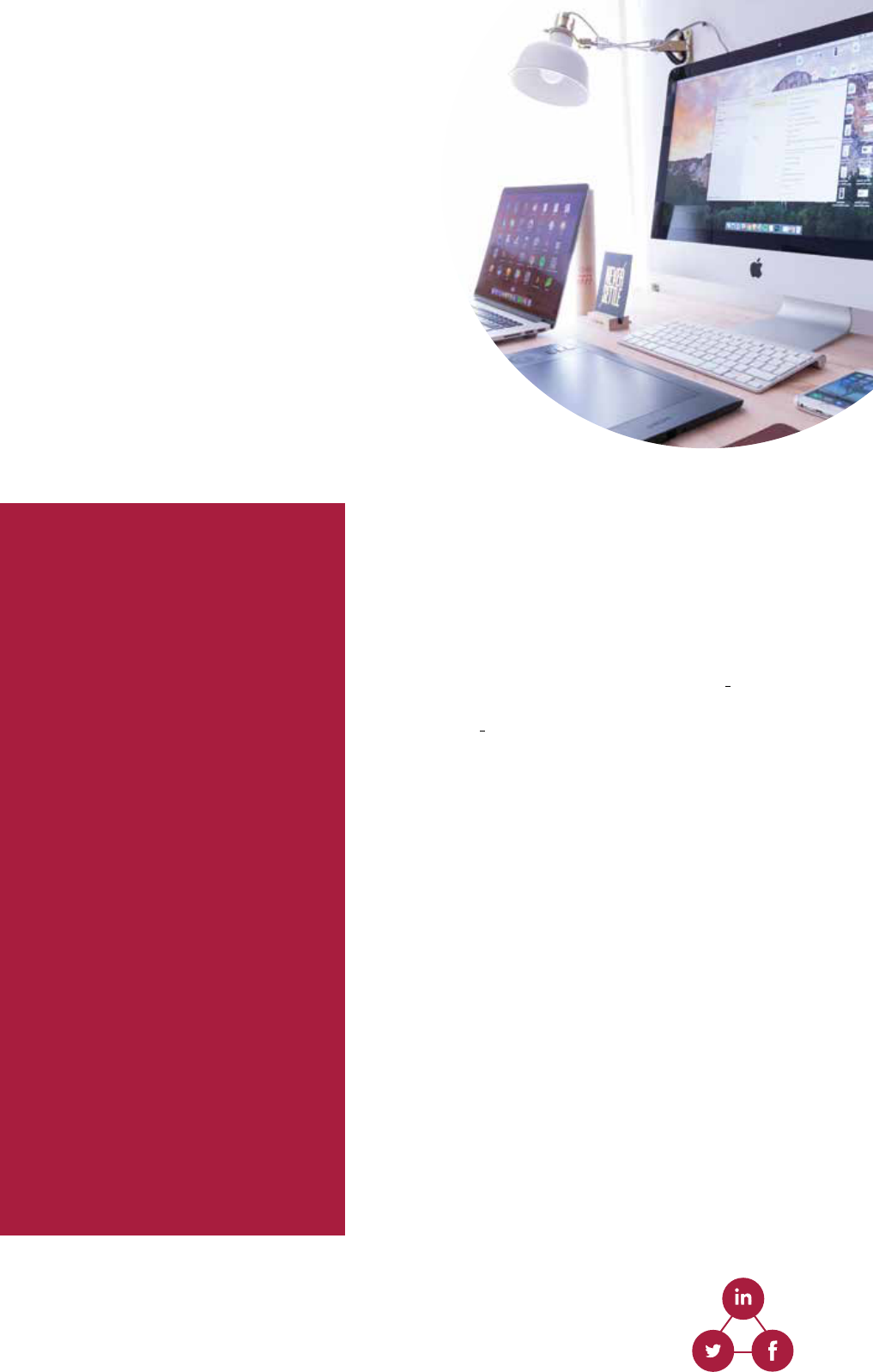
16 16
05
YOU ARE RESPONSIBLE
FOR YOUR ADVERTISING
+ Whether you are using traditional or
social media, you are responsible for
your advertising.
+ Consider whether you want your
website and other social media
platform settings to allow users to
leave comments. If you don’t, then you
can disable the comment section.
+ You must not use a testimonial,
solicited or unsolicited, that refers
to a clinical aspect of care in your
advertising, including on your website
and social media account.
+ Be careful about posting comments or
images about your skills and services
online as they may inadvertently
contravene advertising guidelines.
+ You must not edit an online review
that is negative to make it positive or
no longer accurately reflects all the
reviewer’s feedback.
+ If you do nd comments that could
be considered as testimonials on your
website or social media platforms,
you should remove them to avoid
potentially being found to be in breach
of your professional obligations under
regulatory guidelines.
KEY TIPS
Advertisements for medical services can be useful
in providing inf
ormation for patients.
Doctors advertising through social media should
review their content regularly to make sure that all
material complies with their obligations under the
National Law and Australian Health Practitioner
Regulation Agency (AHPRA) Guidelines for
advertising regulated health services in Australia
8
,
and the Medical Council of New Zealand Statement
on advertising.
9
Remember you are responsible for the advertising
that you publish or that is under your control. You
are not expected to monitor social media for things
that may be written about you in forums you don’t
control.
You are also expected to comply with the AHPRA’s
social media policy, the Medical Board of Australia’s
Code of Conduct in Australia, and in New Zealand,
the Medical Council of New Zealand Statement on
the use of the internet and electronic
communication and Good Medical Practice if you
are active on social media.
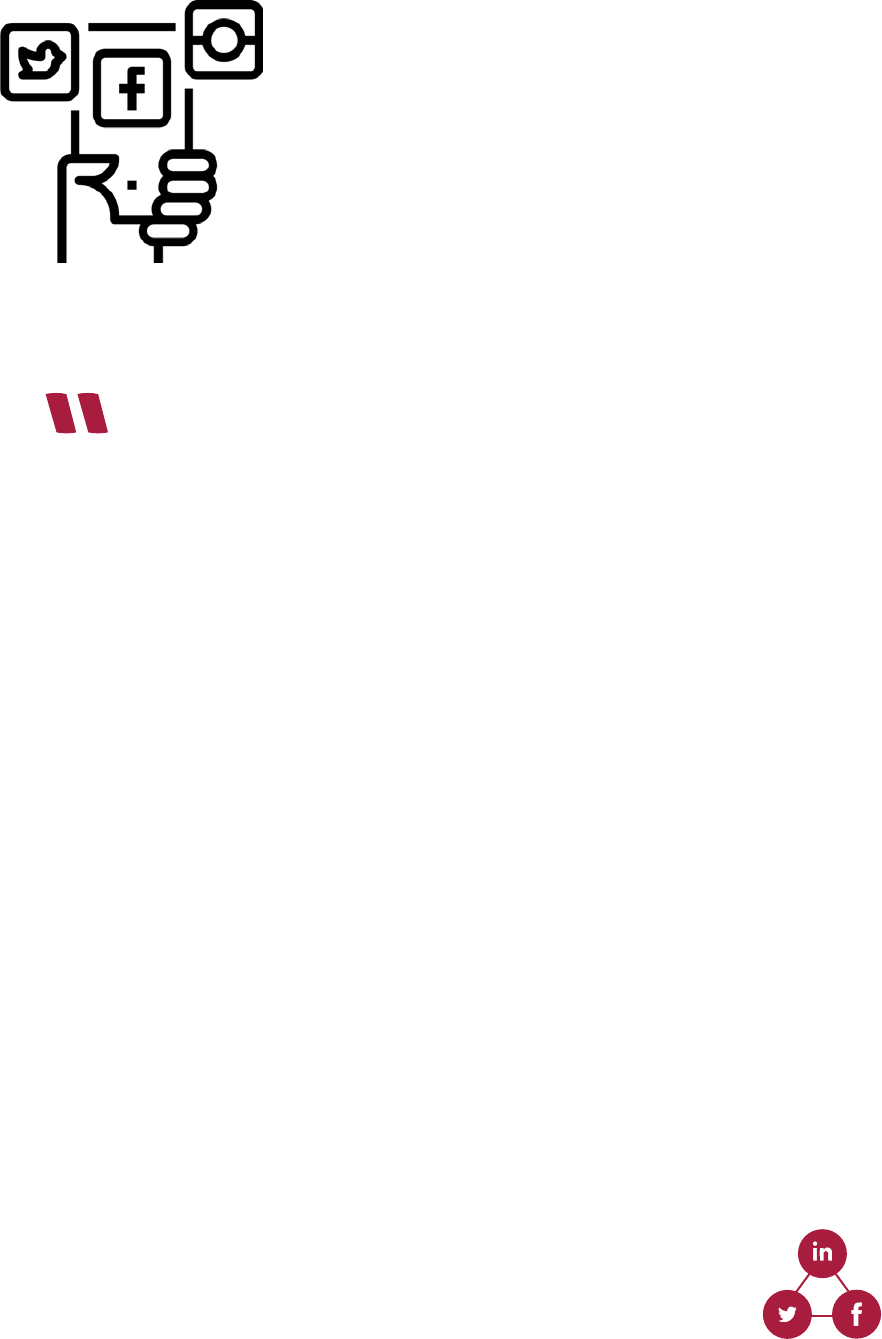
17 17
Beware advertising testimonials
Consumer and patient information sharing websites that
invite public feedback/reviews about their experience of
a health practitioner are not considered “advertising of a
regulated health service” under AHPRA’s guidelines.
However, it is important to be aware that it is not
acceptable to use testimonials in your own advertising,
such as on your website or Facebook. This means you
can’t use or quote testimonials on a site or in social media
that is advertising a regulated health service, including
patients posting comments about a practitioner on the
practitioner’s business website.
Doctors should therefore not encourage patients to leave
testimonials on websites they control and should remove
any testimonials or positive reviews that are posted there.
Sponsorship of personal social media
accounts
It is becoming common practice for people who are
popular on social media to be approached to feature
products on their account. This is particularly prevalent
on Instagram. Medical professionals should be mindful
of how accepting sponsorship on personal social media
accounts and/or supporting products for nancial gain
may reflect on them as a doctor and/or influence them in
their practice.
Doctors should make themselves aware of any regulations
that relate to the advertising of therapeutic goods by health
professionals.
... It’s not
acceptable to
use testimonials
in your own
advertising
05 – YOU ARE RESPONSIBLE FOR YOUR ADVERTISING: A GUIDE TO SOCIAL MEDIA & MEDICAL PROFESSIONALISM
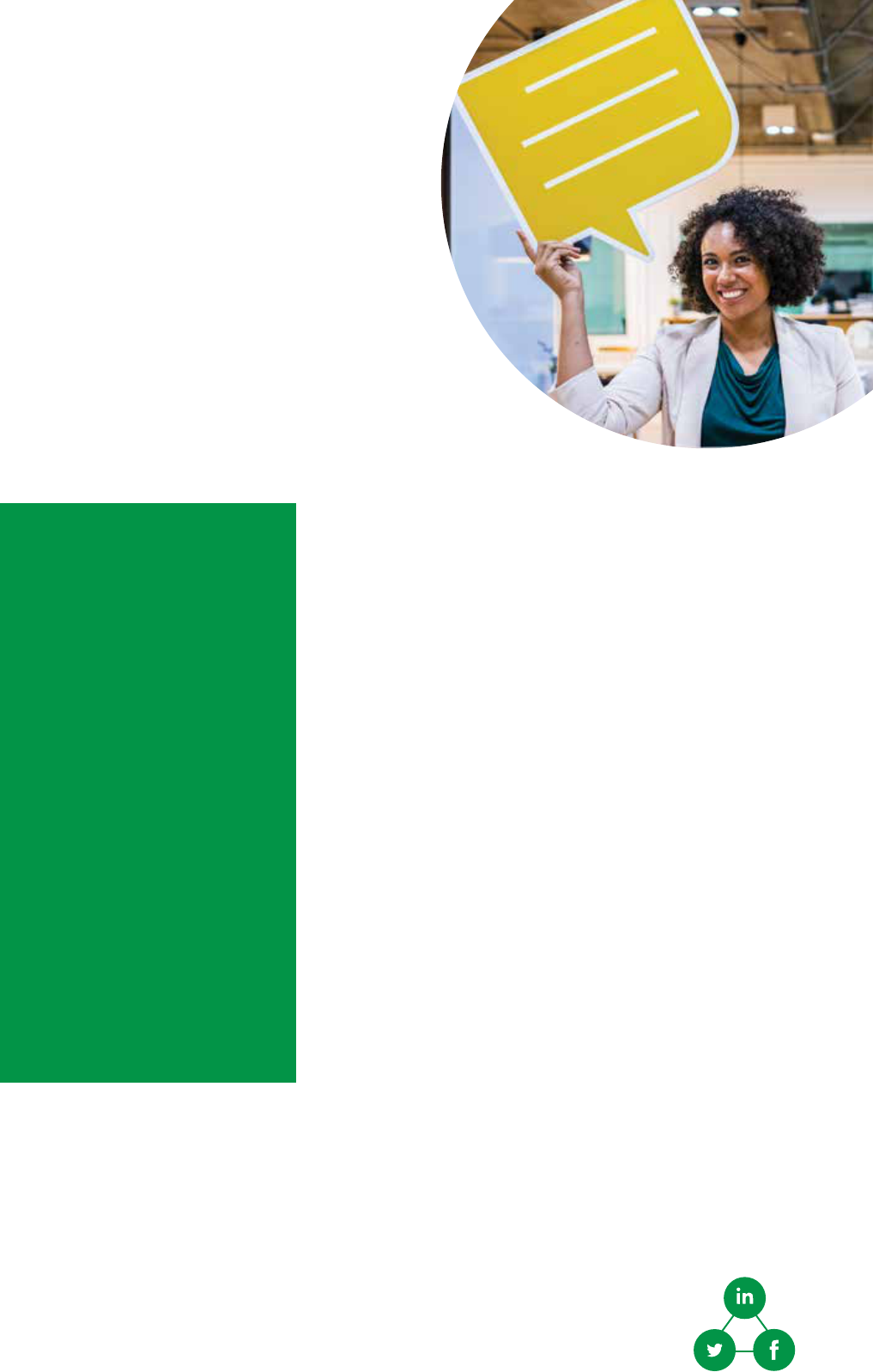
18 18
06
MANAGING NEGATIVE
PATIENT COMMENTS ONLINE
+ If you receive a negative
comment from a patient or
a close relative of a patient
online, resist the temptation
to immediately reply angrily or
defensively.
+ Seek advice from a colleague
and/or AMA or medical defence
organisation about the most
appropriate way to respond.
+ If you can identify the person
who posted the comment,
consider whether it is
appropriate to contact the
person to discuss and address
their concerns.
+ If you nd messages from
someone upsetting or
distracting, consider blocking
or muting them. Persistent
harassers can be blocked from
contacting you or be reported to
the site.
KEY TIPS
Negative comments about you professionally or your
practice in online forums can cause distress and
frustration. There are several ways you can respond:
1
Ignoring the comments and waiting until further
reviews move the negative one down the page.
2
If you can identify the author/s of the comments,
politely ask them to withdraw them or have them
removed from the website.
3
Requesting the forum host to remove offending
comments.
4
Having your practice respond.
5
If the comments about you are false and have caused
you reputational damage, consider instituting legal
proceedings.
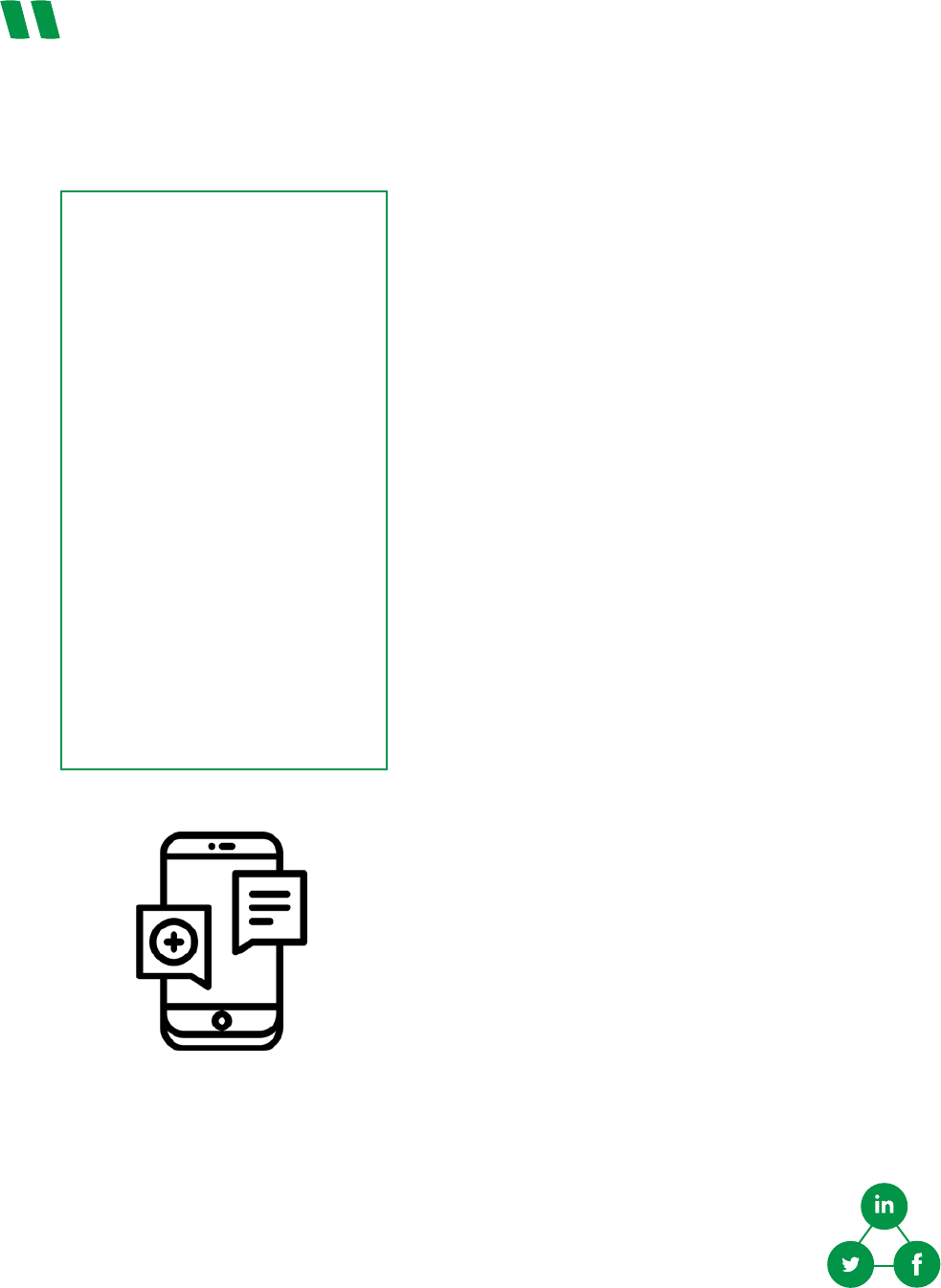
19 19
Certain online forums have policies and methodologies
for the removal of inappropriate or fake comments. For
example, Google Maps allows users to flag inappropriate
reviews on business listings, which will be assessed by
Google and possibly removed. Likewise, Facebook has
a flagging function for public posts as well as personal
messages for abusive content.
If you do choose to respond to a negative online
comment:
1
It is important that you don’t inadvertently breach
patient condentiality and that you do so within
professional boundaries.
2
Think carefully about what the implications for the
doctor-patient relationship might be.
3
Keep it simple and take as neutral a tone as
possible, for example: Thank you for your feedback.
I am committed to improving my practice and have
taken your comments into consideration.
Unwelcome online reviews…
A doctor googled their name and
came across the following review:
“The worst doctor I have ever
seen. I took my daughter to see
him when she was very sick. He
missed the diagnosis and was
deliberately rough with her because
he was hassled. It was like we were
imposing on his time. I’d ask a taxi
driver for medical advice before
seeing this animal of a doctor.
Never see him if you are ill – or
well.”
The doctor was very distressed. He
did not know who had made this
comment about him. He wanted to
know what he could do to have the
online comment deleted.
Example provided by MDA National.
Certain online forums have policies and
methodologies for the removal of inappropriate
or fake comments
06 – MANAGING NEGATIVE PATIENT COMMENTS ONLINE:
A GUIDE TO SOCIAL MEDIA & MEDICAL PROFESSIONALISM
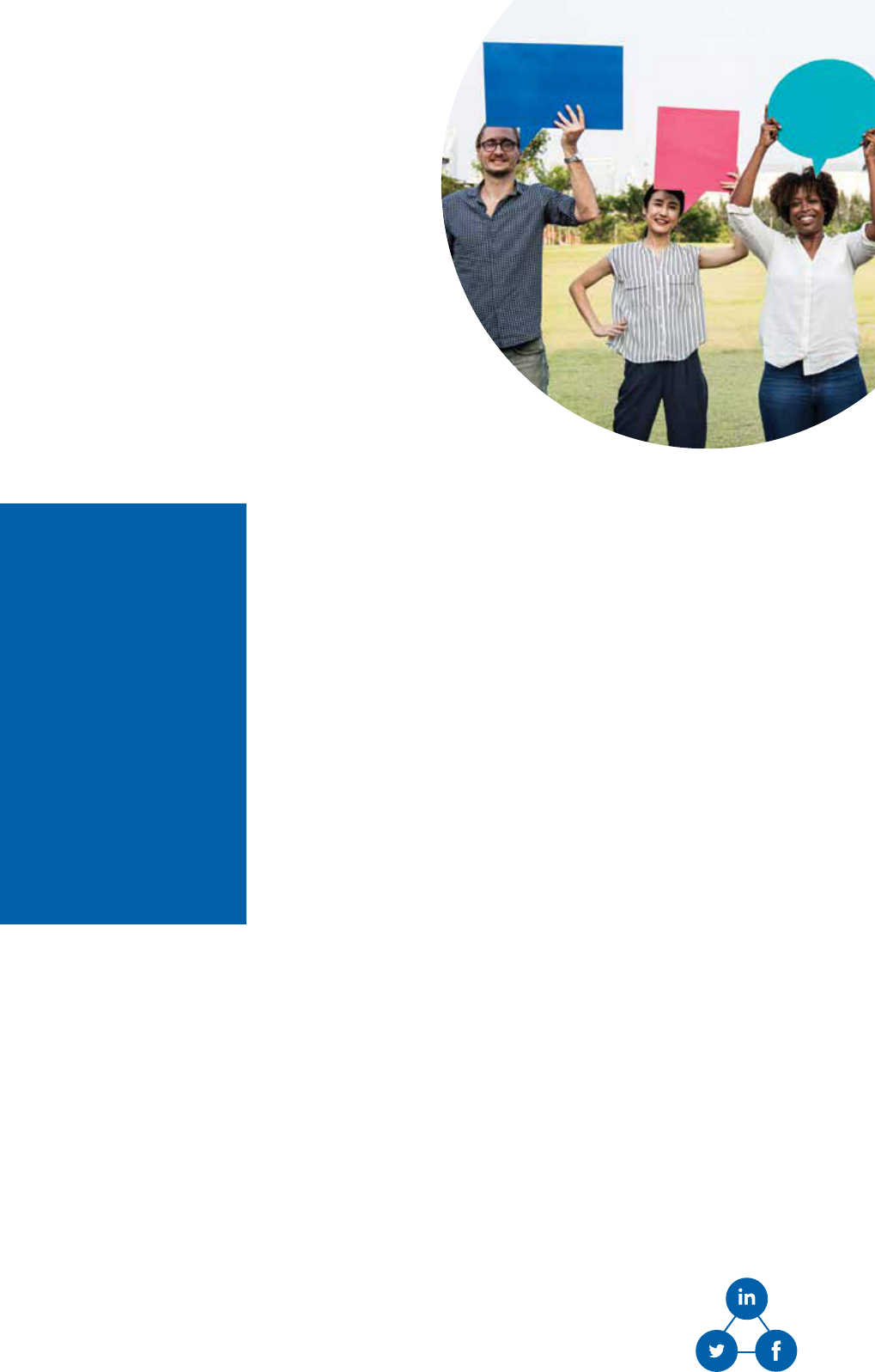
20 20
07
USING SOCIAL MEDIA
FOR ADVOCACY
+ Comment within your
scope of practice.
+ Post content that is well
informed.
+ Abide by your professional
code of conduct.
+ Be aware of your
employer’s policies about
posting on social media.
+ If speaking on behalf of
an organisation, be aware
of their policies regarding
acting as a spokesperson.
KEY TIPS
Using social media to communicate and engage with others can
have potential benets to doctors and the community in general.
Many doctors and medical students want to have a better
connection with the public, journalists, their colleagues, business
leaders and politicians and are using social media to do it.
If you are going to use social media as an advocacy tool,
consider the following.
Identify whether you are speaking as an individual
or on behalf of an organisation
It is important to state whether you are speaking on an issue
in an individual capacity or on behalf of an organisation. If
speaking on behalf of an organisation, make sure you identify
the organisation and have permission to act as a representative.
When presenting a personal opinion which is contrary to the
generally held opinion of the profession, you should indicate
this is the case in order to ensure the community is properly
informed.
Declare any real or potential conflicts of interest
Be upfront in declaring real or potential conflicts of interests.
This is not only in line with professional standards, but also may
protect you from any subsequent criticism. This applies even if
you post anonymously. Any material written in a professional
capacity or by authors who represent themselves as doctors
is likely to be viewed by the public as such and taken on trust.
Failing to declare conflicts of interests could undermine public
trust, compromise the professionalism of authors and in turn risk
referral to the regulatory authorities.
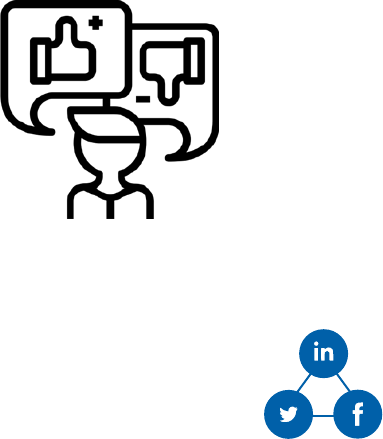
21 21
Be aware of your professional
obligations if raising concerns in
relation to a specic health service
If you believe the health service or environment
that you work in is inadequate or poses a threat
to health, you should alert appropriate authorities
rather than raising these issues through social
media. You should be aware of your employer’s
policies regarding the use of social media to raise
concerns that may be critical of, or reflect poorly
on, your employer or wider health service
Post content regularly and develop an
informed, clear narrative
If you are going to use social media as a tool for
advocacy and campaigning and want to make
your voice heard on a particular topic, deliver
relevant content that is engaging, thoughtful,
balanced and well-informed.
Monitor content, conversations and
engage
Being able to engage with campaigns and
conversations that are happening online creates
momentum but is obviously going to bring you to
people’s attention. Be aware of your influence and
abide by your professional code of conduct.
Avoid unproductive or inflammatory
arguments online
It is quite common when advocating online
that all sorts of people respond, some with a
well-informed counter-argument, but others
may respond in an emotional way or may be
blatantly seeking to start an argument. While it
can be tempting to engage in a ery debate, it
is best to not respond when it is clear someone
is not willing to have a reasoned and informed
discussion. Doing so may reflect poorly to others
who may be reading the discussion.
Leverage the experiences you have
as a professional in your sphere of
influence to create change
Often the public wants to know and understand
what doctors think on a particular health
issue. Think about the content you post, if it is
appropriate to do so in a professional capacity
and abide by your professional obligations
regarding patient condentiality.
Be authentic
Make sure you stay true to yourself as a
professional and what you stand for. Engaging
in genuine conversations about topics you are
passionate about will help to support what you
are trying to achieve on social media.
07 –USING SOCIAL MEDIA FOR ADVOCACY: A GUIDE TO SOCIAL MEDIA & MEDICAL PROFESSIONALISM

22 22
22
08
FURTHER READING
Australian based resources
• Australian Health Practitioner Regulation Agency. Further information on advertising and the
National Law
• Australian Health Practitioner Regulation Agency. Guidelines for advertising regulated health
services
• Australian Health Practitioner Regulation Agency. Social media policy
• Australian Medical Association. Position Statement: Medical Professionalism - 2010. Revised
2015
• AMA Guidelines for Maintaining Clear Sexual Boundaries Between Doctors and their Patients and
the Conduct of Patient Examinations 2019
• Australian Medical Association. Code of Ethics 2004. Editorially Revised 2006. Revised 2016
• Australian Medical Association. Guide to Clinical images and the use of personal mobile devices
• Medical Board of Australia. Good medical practice: a code of conduct for doctors in Australia
• Medical Board of Australia. Guidelines: Sexual boundaries in the doctor-patient relationship. 2018
• Medical students’ ethics toolkit – students and social media (BMA 2014)
• Office of the Australian Information Commissioner (OAIC). Social media, information and
communications technology and identity security
• RACGP. Guide for the use of social media in general practice
• Avant. Social media for doctors: keeping it professional
• MDA National. How Does my Doctor Rate?
• Social Media and the 21st-Century Scholar: How You Can Harness Social Media to Amplify Your
Career
• Therapeutic Goods Advertising Code (No.2) 2018
• Social media - practical guidance and best practice (BMA 2017)
• Social media, ethics and professionalism guidance (BMA 2017)
• World Medical Association. Statement on the Professional and Ethical use of Social Media

23 23
23
New Zealand based resources
• Code of Professional Conduct for Medical Students at the Universities of Auckland and Otago
• Medical Council of New Zealand. Cole’s Medical practice in New Zealand
• Medical Council of New Zealand. Good Medical Practice
• Medical Council of New Zealand. Professional Boundaries in the Doctor-Patient Relationship
• Medical Council of New Zealand. Statement on the use of the internet and electronic
communication
• Medical Council of New Zealand. Statement on advertising
•
New Zealand Medical Association. Clinical images and the use of personal mobile devices
• New Zealand Resident Doctors Association. RDA Guidelines with regard to the use of personal
mobile devices and clinical images
• Netsafe. Online safety for New Zealand.
